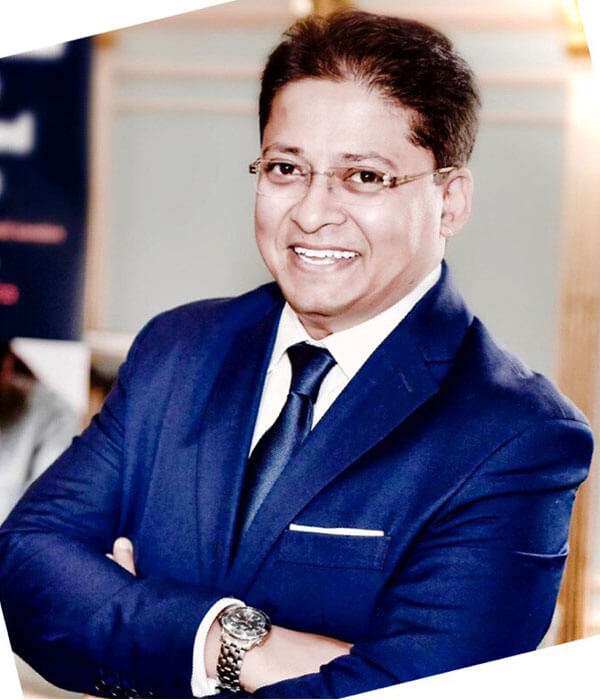Sumit Mitra, BSc, MBA, FCMI
Doctorate of Management Excellence
Recipient of Shared Services Forum’s “BPM Achiever in Global India”
Sumit Mitra is a versatile senior executive and board member with over 20 years’ experience in outsourcing, P&L management, client management and business transformation.
He is a strategic thinker with shrewd commercial acumen and experience in building and managing large globally diverse teams. His track record on execution is through his unique ability to join the dots in a complex multinational environment and making things simple.
Sumit is currently the Chief Executive Officer for Tesco PLC’s Global Business Services division and CEO of the Tesco Bengaluru entity. He is also board member of Tesco’s joint venture, Trent Hypermarket and Booker India, with the Tata Group.

Prior to joining Tesco, Sumit was the Managing Director of British Telecom (BT), where he conceptualized and executed BT’s Global Business Services (GBS) model with direct responsibility for 10,000 plus employees across 9 countries and several 3rd party vendors. He led BT GBS to one of the top 25 best employers in India and Budapest as the best shared service centre in Europe.
Sumit studied in Scotland and has a Bachelor of Medical Sciences degree and a Master’s in Business Administration. He has completed the Global Strategic Management program from Harvard Business School in Boston and has received an honorary doctorate (Honoris Causa) in Management Excellence.
Sumit holds a cricket coaching diploma from the England & Wales Cricket Board and is an expert in martial arts. He is a passionate Manchester United supporter, loves traveling and enjoys spending time with his two daughters.
The Conversation
SSF: What has been the guiding principle for an ongoing large conglomerate like yours to respond to the disruption caused by Covid-19? What has been the impact – in favour or against?
Sumit: We realized the potential of AI and machine learning quite early, so more than four years ago we came up with Nokia AVA, which has also been rated as #1 telco and AI framework in the industry by many analyst houses. It has won over ten innovation awards in the industry. It enables predictive capabilities through data-driven insights and intelligence from network data. As an example, through machine learning and predictive analytics, we can predict and prevent service degradation of a cell site, up to seven days in advance. This means Communications Service Providers (CSPs) can predict issues before they occur to improve service quality and reduce customer complaints. Further, root-cause analysis and action recommendations give the operations teams further insight into how best to maximize network availability and boost service quality for subscribers. Likewise, we are also using analytics to solve challenges in supply chain management for smooth procurement and uninterrupted logistics management.
SSF: How can business services contribute better towards the corporate objectives and become partners to the business and not remain mere service providers?
Sumit: Our guiding principles have been very clear; we put the wellbeing of our colleagues, customers and suppliers right at the heart of all our decision making. It all starts with connecting with our purpose of serving our shoppers little better every day. This allows us to do “what is right for our customers” regardless of the financial impact - putting our purpose before profits. While sticking to our values of treating our colleagues how they would like to be treated, we appreciate that every one’s issues are different. We are all in the same storm but in different boats. So, it is critical that we personalise how we treat our colleagues and differentiate in terms of help and support we provide them.
The impact of this has been significant. We incurred almost £890m of additional costs on several measures, such as increased support for our frontline colleagues, improved safety and other precautionary measures for our customers, providing additional on-line slots for vulnerable customers, etc. While we understand and appreciate the impact on the P&L, clearly it was the right thing to do. This has overall positively impacted our public image with our brand index going up by 221 points during the last year.
SSF: What is your advice on delivery strategies for organisations of today given that disruption may become a consistent reality of the future?
Sumit: We live in a VUCA world. VUCA is not a new feature. It was there before and will continue to be there in the future. Building a strong culture of agility and an ability to quickly to adopt and adapt to change is crucial for survival. I am a firm believer that ‘culture eats strategy for breakfast’.
Building a strong culture of agility and an ability to quickly to adopt and adapt to change is crucial for survival. I am a firm believer that ‘culture eats strategy for breakfast’.
Therefore, there is no other delivery strategy that is more important than building the right culture. The second element to the strategy is having the right processes - processes that are lean and have e2e visibility. The two elements of culture and process helps accelerate the execution of digital transformation which helps unlock value not only for the customer but also for colleagues, suppliers and ultimately for the shareholders.
SSF: How does one create professional organisations requiring seemingly contradicting structures – agile, yet firm; dominant, yet complementary, and fleet-footed, yet cautious?
Sumit: These may seem contradictory terms but are actually harmonious. To develop the organisation into a contemporary enterprise, it is important that all the elements of modern business be established within. This can be akin to a parent, who needs to be firm when required, yet flexible when the situation demands it. No organisation can exist with defined or restricted characteristics. This too is a significant part of the culture of the company. Leaders should be like parents in this case. Such leaders help organisations choose the best course of action in the situation they are. Operational strategies can well change quickly with changes in the situations. Leaders then lay down the culture of harmonious coexistence of corporate characteristics.
Operational strategies can well change quickly with changes in the situations. Leaders then lay down the culture of harmonious coexistence of corporate characteristics.
Underneath the culture there is a need to have a level of governance and framework which gives accountable freedom to colleagues. This allows colleagues to take accountability of the work they do, yet they are empowered to have the flexibility to deliver how they want it but within the governance framework.
SSF: Is technology - human interface likely to become more ingrained in the future? Can having a digital workforce ever be welcomed by people?
Sumit: Surely having a digital workforce is a welcome move. Most people embrace it with a passion. People do not attain university degrees merely to deliver “rule based” and repetitive tasks. Such tasks quickly become tiresome and drive monotony which in turn drives attrition. These tasks are best carried out by robotic tools, which are far more consistent and accurate than humans. This allows the workforce to use their intelligence to deliver more value-added activities to move up the value chain, which in turn empowers them to have a fruitful and rewarding career. The faster our workforce can replace themselves with BOTs, the better it is for their careers as it allows them to learn new skills and gain new knowledge which will set them up for the future. This is only likely to grow, as we become more technology savvy and dependent.
Then there are some who think of digitisation as regressive and detrimental to the interest of the employees. Usually, such people have aversion to new learnings. Recognising the existence of this aversion and working to mitigate it becomes an important function of the organisation. Thankfully, such situations are uncommon.
SSF: Probably ‘Empathy’ and ‘Emotional Intelligence’ continue to be the most powerful forces of nature. How do you channelise it to drive a high morale and a high delivery culture?
Sumit: They are the armoury of any leader. Empathy is the ability to understand another person’s experience, perspective and feelings. It is commonly described as the ability to put oneself in another person’s shoes. Empathy increases life satisfaction and self-esteem. Emotional intelligence refers to the ability to perceive, control, and evaluate emotions, especially in others. To a certain extent both empathy and emotional intelligence overlap. They are both skills that reach out to others to express togetherness and understanding. EQ along with empathy creates a formidable combination in a leader. Such a leader can relate well with the teams, can share the corporate or his/ her own vision, and can create a bond that can transverse the relationship of hierarchy.
A great example of this is the kind of bond one gets to see in the armed forces across the world. The team can relate extremely well with each other and can go the extra mile on the suggestion of their leader. Same is the case in the corporate world. Leaders with extraordinary skills of empathy and emotional intelligence can move mountains simply by motivating the teams.
SSF: With an elusive future of work and introduction of the gig workforce of today, do you see a shift from role-based to project-based work?
Sumit: The successful companies of tomorrow will be those that can adapt to the shifting work environment paradigm. Today’s workers are increasingly rejecting the notion of the typical dream which includes moving up the company ranks through a 35-year career. Instead, more and more workers have decided that their most rewarding career is more about flexibility, new challenges, and contributing to tangible work outcomes, and less about job titles and full-time status. As a result, workers are becoming more specialized, independent, mobile, collaborative, and digitally connected.
…more and more workers have decided that their most rewarding career is more about flexibility, new challenges, and contributing to tangible work outcomes, and less about job titles and full-time status…. workers are becoming more specialized, independent, mobile, collaborative, and digitally connected.
Workers’ changing priorities coincide with enterprises’ increasing need to cut wasteful spending and become more productive, nimble, and responsive to the dynamic marketplace. Companies are already taking notice and realizing the advantage of engaging this agile, contingent workforce. Strategic use of consultants, freelancers, and other non-traditional workers can save companies money and make them more productive by giving them access to rare skillsets their full-time employees may not possess.
Having said that, the answer will probably be a mixture of both role based and project based. Flexibility is the name of the game. Everyone is different therefore their needs are different. So if the organisation can accommodate and create this flexibility, they are going to be able to retain and attract talent.
SSF: How does one encourage the sense of innovation, even radical innovation, which seems to have been the saviour competency to get us out of a tough situation of the pandemic?
Sumit: We need to be cognizant of the fact that innovation is one of the toughest challenges an executive faces. How to get people to think creatively—to challenge the status quo—while keeping the everyday operations running smoothly? Innovation is not like most other business functions and activities. There are no reliable templates, rules, processes, or even measures of success. In a sense, each act of innovation is a unique feat, a leap of the individual, or the collective, imagination that can be neither predicted nor replicated. Innovation is anything but business as usual. A culture of innovation and continuous improvement needs to be embedded in the corporate DNA and should be bottom-up. This allows opportunity to automate rather than other way round.
A culture of innovation and continuous improvement needs to be embedded in the corporate DNA and should be bottom-up. This allows opportunity to automate rather than other way round.
For such a culture to propagate and grow, a sense of encouragement to experiment needs to be established. It should be understood that experimentation is both time and resource consuming. It also fails frequently, requiring the corporate leadership to have a tolerant attitude. Just like a DNA change, this is deep seated and long term. Those organisations which had a better approach to innovation were perhaps better prepared when the pandemic induced lockdown was imposed.
SSF: There is an ever-changing relationship between the shared service centres and the parent organisation – more so during the Covid lockdown. How are these wheels moving within professionally run organisations, such as yours?
Sumit: Professionally run service centres such as ours demonstrated their worth extremely well during the lockdown. Dave Lewis, our ex-CEO commented “Tesco Business Services did not miss a beat during the pandemic” at one of his review meetings. Coming from the Group CEO, we take this as a great testament of our resilience and relationship with the parent organization. This did not happen overnight. It took years and carefully planned clear strategy, the right framework, operational excellence and building emotional connects.
Coming from the Group CEO, we take this as a great testament of our resilience and relationship with the parent organization. This did not happen overnight. It took years and carefully planned clear strategy, the right framework, operational excellence and building emotional connects.
Over the period, we at TBS, have grown our relationship with the “mothership” and continuously unlocked value through the shared services model. The parent origination has increasingly given us tougher and important functions and also increased their dependency on us to deliver superlative services. We are now considered integral to the organisation and a part of the corporate functional strategy. The lockdown period has proved once again the fact that we can be depended upon to deliver our services under any circumstance.





